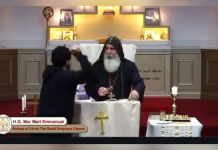A recent article by the Booker Prize-nominated English Anglican author, Francis Spufford, ‘How I changed my mind about same-sex marriage’, raises this question: how can revisionists continue to justify the episcopate?
In his piece for the Chicago-based liberal magazine, The Christian Century, Spufford writes:
‘When I was against same-sex marriage, say, 15 years ago, it was not (or at least I thought it was not) from any desire to discriminate against same-sex couples.
‘I come from the generation of straight people who, arriving at adulthood in the 1980s, from college on always had friends who were gay, thought of our own heterosexuality as one possibility among several, and didn’t find anything troubling in the knowledge that our gay friends were sexually active. I find it hard to imagine being disgusted or horrified by what same-sex lovers do in bed together.
‘The issue with marriage, I believed, was definitional. Marriage was the name for the pair-bonding that a man and a woman entered into. There should be other names, I thought, for the pair-bonds of men who loved men and women who loved women.’
But now Spufford has changed his mind and thinks the Church of England should start conducting same-sex marriages.
In framing his argument, he is careful to genuflect before ‘Christian history’:
‘I have come to realize that the process by which we come to adjust our sense of how much we should be bound by the rules of the past is not recent, not some invention of liberal modernity. It is utterly mainstream in Christian history.
‘Changing our minds about gay sex, and therefore about the possibility of same-sex marriage, is simply a recent example. There were endless previous difficult issues, hidden now by a kind of amnesia flowing from our proper and shared small c conservatism—which, when we have achieved a necessary change, tends to restore, as the most important item for us to focus on, our sense of the long continuity of the past.’
But despite his claim to be in the historical mainstream, Spufford’s argument is essentially recycled revisionism. Paul was wrong about slavery which is why he was also wrong to condemn practising homosexuality in Romans 1. An answer to Spufford’s argument is available in this article on Christian Today.
But the question here is: why not apply Spufford’s revisionist method to the episcopate and ‘adjust our sense of how much we should be bound by the rules of the past’?
The Form of Ordaining or Consecrating a Bishop in the Book of Common Prayer includes a passage from 1 Timothy 3: ‘This is a true saying, If a man desire the office of a bishop, he desireth a good work.’
Given that many liberals believe 1 Timothy was not written by the Apostle Paul but by a later writer posing as Paul, why should 1 Timothy and in particular the BCP’s choice of the word ‘bishop’ for the Greek word ‘episcopos’ be regarded as authoritative?
Moreover, even if 1 Timothy was definitely by Paul, according to Spufford’s reasoning, the Church is allowed to say Paul was wrong.
What is the basis for setting apart a class of church leaders who unlike local church ministers are responsible for a wider district called a diocese and for ordaining clergy? In the BCP Ordinal the bishop is asked a question not put to a priest or presbyter: ‘Will you be faithful in ordaining, sending, or laying hands upon others?’
If the episcopate as constituted in the Church of England derives its authority from the Bible, surely it is vulnerable because revisionists happily dismiss parts of the Bible they don’t like?
If the episcopate derives its authority from church tradition, surely it is also vulnerable because revisionists are happy to depart from church tradition? The episcopate used to be an exclusively male preserve in the Church of England but in 2014 its governing body, General Synod, voted to allow women bishops.
If a motion ever did become before General Synod to abolish the episcopate, it would spark a fascinating debate. How would Synod members who think like Francis Spufford, especially those wearing purple shirts, justify their support for bishops?
Julian Mann is a former Church of England vicar, now an evangelical journalist based in the UK.










